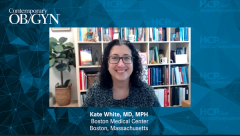
Contraception: Hopes for the Future
Kate White, MD, MPH, and Harold Bays, MD, discuss their hopes for the future of contraception options, affordability, and clinical trials evaluating their efficacy.
Episodes in this series

Kate White, MD, MPH: Even with the best counseling in the world and the best setup for success, it doesn’t mean all patients like all methods. I know that patients who struggle with irregular bleeding or unpredictable bleeding on birth control have a really hard time with their method, and its one of the biggest reasons people will stop using a birth control method. I try to tell patients that if they ever want to make a change, they should give me a call, or reach out to me. We can try to either manage adverse effects they’re experiencing on methods, or I can help them switch to something else. One of the things I worry about a lot is patients who will stop birth control on their own and continue to have sex that risks pregnancy, and don’t start another method right away. A lot of patients don’t realize just how fast you can get pregnant after stopping birth control.
We know there’s a certain kind of person who enters clinical trials. Clinical trials routinely have enrolled people who have a lot of time to have a lot of study visits, have high health literacy, tend to be young, and tend to be very healthy. It makes sense that you want to try out new methods or any kind of new medications in a really healthy patient population. But that can make it difficult then when you’re trying to counsel patients later who may not be as healthy as the population of people who were in the trials. We also know that historically, patients who have been enrolled in studies tend to be white, middle class, and cisgendered. Then again, that can make it difficult when you’re counseling patients who don’t fit this profile, whether these results will apply to them or not. It’s one of the reasons we are trying to increase the diversity of patients who come into these studies, so that the results are applicable to everyone.
Harold Bays, MD: What kind of clinical trials would I like to see that are above and beyond what we already have? As a clinical trialist, that’s what I do for a living. There are a lot of different kinds of clinical trials I would like to see. You would think that by now there would be this overwhelming amount of clinical trial data where there would be no question about what we specifically should be advising our patients. I think there is always a benefit to getting more information. I’ll just give one example. It would be of value to have a prospective blinded, randomized, long-term clinical trial to evaluate the more commonly used contraceptives with regard to efficacy, safety, and especially health outcomes with regard to cardiovascular events, including thrombotic events. I’m talking about long-term clinical trials using the common therapeutics we now use.
We do have clinical trial data, obviously, but a lot of times, the results of those trials send sort of a mixed message. Where we are right now, we go back to the basics. The basics are that historically, estrogen-based therapies do have some degree of risk of thrombosis. Exactly the degree of that risk is obviously much less with the lower doses of estrogens and such. An increase in body mass index increases risk of thrombosis, whether it be through the adiposopathic, “sick fat” disease with the immunopathy and endocrinopathy, or the increase in fat mass disease with compression of venous returns. Then, the other one that was mentioned earlier, cigarette smoking, clearly increases the risk of thrombosis.
Having those three things together sounds like a very bad plan. Before any female engages in estrogen-based contraception, particularly if they have excess weight, obesity, and the cigarette smoking, they need to have a patient-centered conversation with the cardiologist, ob-gyn [obstetrician-gynecologist], and the primary care clinician. It sure wouldn’t hurt to have input from the pharmacist as well. Then, if a female happens to be followed by a nurse practitioner or physician assistant, excellent clinicians, that would also be a pretty strong option to get the information, in order to be both effective with regard to the contraception, but also to be safe.
Some takeaway messages would be the following. We know that higher-dose estrogen increases the risk of thrombosis, that we know. As far as the lower doses of estrogen, the data are not always consistent, but we also know there are some guidelines out there. If you have a female out there who’s at risk for thrombosis, and particularly if she has an increase in body mass index, or the example that was given earlier, cigarette smoking and such, before prescribing an estrogen-based oral contraceptive, there needs to be a conversation. Take that patient-centered approach, talk to the clinician, talk to the pharmacist, get the information, be educated, and then, make the best decision with regard to the balance of benefit versus risk. That’s No. 1.
No. 2, know that there are alternatives out there. It doesn’t have to be a pill. Secondly, it doesn’t have to be estrogen. You could have progestin-only therapy as a potential option. Also if I had to pick, the single biggest takeaway I would like to convey to clinicians who are trying to best take this patient-centered approach, what would be the overriding theme for everything I’ve talked about? That would be what I said at the very beginning, the principle of primum non nocere, which is first do no harm. That’s our guiding light in medicine, isn’t it? When you’re having a conversation, and there are risks involved and potential options involved, taking that approach is going to give good guidance as to the most appropriate therapy to recommend.
Transcript Edited for Clarity
Newsletter
Get the latest clinical updates, case studies, and expert commentary in obstetric and gynecologic care. Sign up now to stay informed.









